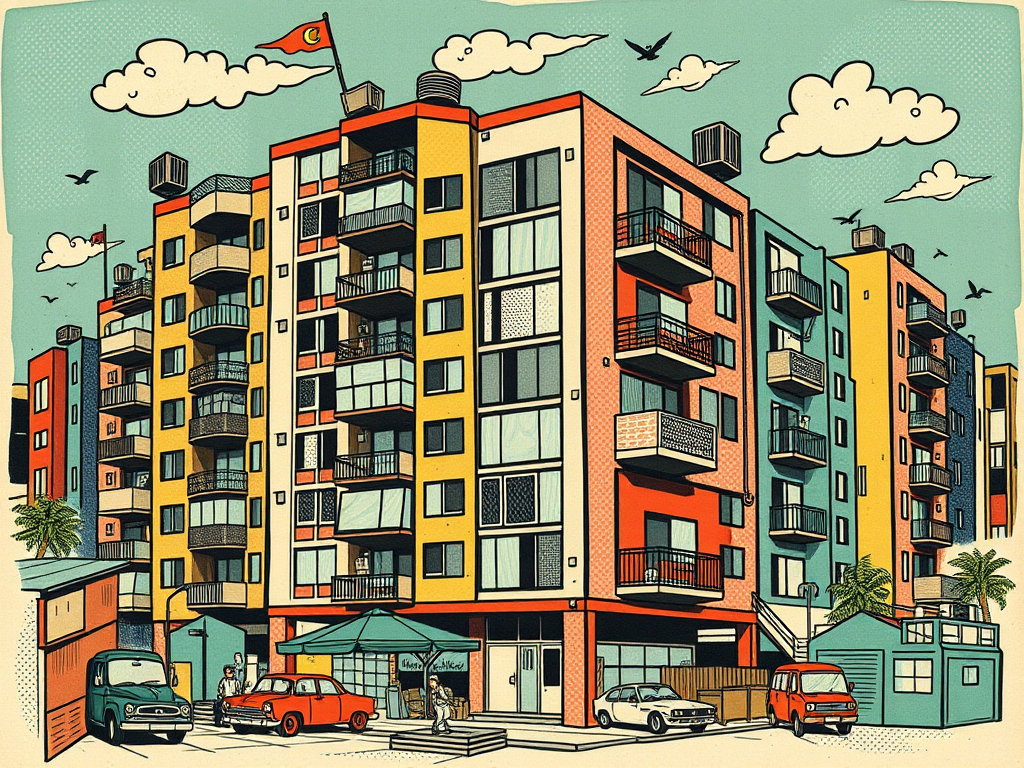
Condo Living in Greece: Understanding Apartment Building Rules and Fees
Reading time: 15 minutes
Table of Contents
- Introduction to Greek Condo Living
- Legal Framework for Apartment Buildings in Greece
- Common Areas and Shared Responsibilities
- Building Management and Administration
- Financial Aspects of Greek Condo Living
- Rules and Regulations in Greek Apartment Buildings
- Dispute Resolution and Legal Recourse
- The Future of Condo Living in Greece
- Conclusion
- FAQs
1. Introduction to Greek Condo Living
Greece, with its rich history and stunning landscapes, has long been a desirable destination for both domestic and international property buyers. In recent years, the concept of condo living has gained significant traction, particularly in urban centers like Athens. This shift towards apartment living brings with it a unique set of rules, regulations, and financial considerations that prospective buyers and current owners must navigate.
As the Greek real estate market continues to evolve, understanding the intricacies of condo living becomes increasingly important. This comprehensive guide aims to shed light on the various aspects of apartment building rules and fees in Greece, providing valuable insights for those considering investing in athens property or managing their existing Greek condo.
2. Legal Framework for Apartment Buildings in Greece
The legal foundation for apartment buildings in Greece is primarily governed by Law 3741/1929, which has been amended several times over the years to address modern living requirements. This law establishes the concept of “horizontal property,” which allows for individual ownership of apartments within a larger building structure.
Key Legal Concepts
- Horizontal Property: This concept allows for the division of a building into separate, individually-owned units while maintaining shared ownership of common areas.
- Regulation of Co-Ownership: This document outlines the rights and obligations of apartment owners within the building.
- General Assembly: The decision-making body composed of all apartment owners in the building.
Understanding these legal foundations is crucial for anyone looking to engage in condo living in Greece. It sets the stage for how buildings are managed, how decisions are made, and how conflicts are resolved.
3. Common Areas and Shared Responsibilities
In Greek apartment buildings, common areas are spaces shared by all residents. These typically include:
- Entrance halls and lobbies
- Staircases and elevators
- Rooftops and terraces (unless privately owned)
- Gardens and outdoor spaces
- Parking areas
The maintenance and management of these areas are shared responsibilities among all apartment owners. This collective approach to building upkeep is a fundamental aspect of condo living in Greece and plays a significant role in determining building fees and rules.
Importance of Shared Spaces
Common areas not only contribute to the overall value and appeal of the property but also serve as spaces for community interaction. Well-maintained common areas can significantly enhance the living experience and potentially increase property values over time.
4. Building Management and Administration
Effective management is crucial for the smooth operation of any apartment building. In Greece, this responsibility typically falls to:
The General Assembly
This body, composed of all apartment owners, meets regularly to make important decisions regarding the building. Key responsibilities include:
- Approving annual budgets
- Electing the building manager
- Deciding on major repairs or renovations
- Modifying building rules and regulations
The Building Manager (Διαχειριστής)
Elected by the General Assembly, the building manager’s role includes:
- Day-to-day management of the building
- Collecting monthly fees from owners
- Arranging for repairs and maintenance
- Enforcing building rules and regulations
Effective building management ensures that the property remains well-maintained, financially stable, and a pleasant place to live for all residents.
5. Financial Aspects of Greek Condo Living
Understanding the financial obligations associated with condo living in Greece is crucial for both prospective buyers and current owners. These financial aspects typically include:
Monthly Maintenance Fees (Κοινόχρηστα)
These fees cover the regular expenses associated with maintaining and operating the building. They typically include:
- Cleaning of common areas
- Electricity for common spaces
- Water for shared usage
- Elevator maintenance
- Building insurance
- Minor repairs and upkeep
The amount each owner pays is usually calculated based on the size of their apartment relative to the total building area.
Special Assessments
For major repairs or improvements, the General Assembly may approve special assessments. These are one-time fees charged to all owners to cover significant expenses such as:
- Major structural repairs
- Elevator replacement
- Facade renovations
- Energy efficiency upgrades
Reserve Fund
Many buildings maintain a reserve fund to cover unexpected expenses or plan for future major repairs. Contributions to this fund are typically included in the monthly maintenance fees.
6. Rules and Regulations in Greek Apartment Buildings
Living in a Greek apartment building comes with a set of rules and regulations designed to ensure harmonious coexistence among residents. These rules are typically outlined in the building’s Regulation of Co-Ownership and may include:
Noise Restrictions
Most buildings have quiet hours, usually from 2:30 PM to 5:30 PM and 11:00 PM to 7:00 AM. During these times, residents are expected to minimize noise that could disturb neighbors.
Pet Policies
Rules regarding pets can vary widely between buildings. Some may prohibit pets entirely, while others may allow them with certain restrictions.
Balcony and Exterior Appearance
Many buildings have rules about what can be placed on balconies or how the exterior of individual units should be maintained to preserve the overall aesthetic of the building.
Short-term Rentals
With the rise of platforms like Airbnb, many buildings have implemented rules regarding short-term rentals to maintain the residential character of the building.
7. Dispute Resolution and Legal Recourse
Despite best efforts, disputes can arise in any communal living situation. In Greek apartment buildings, the process for resolving conflicts typically follows these steps:
Internal Resolution
Many issues can be resolved through discussion with neighbors or by bringing the matter to the building manager or General Assembly.
Mediation
For more complex disputes, professional mediators can be engaged to help find a mutually acceptable solution.
Legal Action
As a last resort, legal action can be taken through the Greek court system. This is typically reserved for serious violations of building rules or significant financial disputes.
8. The Future of Condo Living in Greece
As Greece continues to modernize its urban centers and attract international investment, the landscape of condo living is evolving. Several trends are shaping the future of apartment living in Greece:
Sustainability Initiatives
Many buildings are implementing green technologies and energy-efficient systems to reduce environmental impact and operating costs.
Smart Building Technology
The integration of smart home technologies and building management systems is becoming increasingly common, offering enhanced security, energy management, and convenience for residents.
Community-Focused Amenities
Newer developments are incorporating more shared spaces and amenities to foster a sense of community among residents, such as rooftop gardens, co-working spaces, and fitness centers.
9. Conclusion
Condo living in Greece offers a unique blend of modern convenience and traditional Mediterranean lifestyle. Understanding the rules, fees, and management structures associated with Greek apartment buildings is crucial for anyone considering this type of property investment or already living in a Greek condo.
While the legal and financial aspects may seem complex at first, they are designed to ensure fair and efficient management of shared living spaces. By familiarizing yourself with these aspects, you can make informed decisions and fully enjoy the benefits of condo living in Greece.
As the Greek real estate market continues to evolve, staying informed about changes in regulations and market trends will be key to maximizing your investment and living experience in this beautiful Mediterranean country.
10. FAQs
Q1: Can foreign nationals own apartments in Greece?
A1: Yes, foreign nationals can own apartments in Greece. However, there are some restrictions in border areas and on certain islands for security reasons. It’s advisable to consult with a local real estate lawyer for the most up-to-date information.
Q2: How often are General Assembly meetings held in Greek apartment buildings?
A2: General Assembly meetings are typically held at least once a year, usually to approve the annual budget and elect the building manager. Additional meetings can be called as needed to address specific issues or make important decisions.
Q3: What happens if an owner doesn’t pay their share of building fees?
A3: If an owner fails to pay their share of building fees, the building management can take legal action to recover the debt. This may include placing a lien on the property or, in extreme cases, forcing a sale of the apartment to recover the owed amounts.
Q4: Are there any tax implications for owning an apartment in Greece?
A4: Yes, apartment owners in Greece are subject to various taxes, including property tax (ENFIA), income tax on rental income (if applicable), and capital gains tax if the property is sold. It’s recommended to consult with a Greek tax professional for detailed information based on your specific situation.
Q5: Can the rules of an apartment building be changed?
A5: Yes, the rules of an apartment building can be changed through a decision of the General Assembly. However, this typically requires a significant majority vote, often 2/3 or more of the owners, depending on the nature of the change and the building’s specific regulations.

Article reviewed by Sophia Georgiadou, Global Expansion Consultant | Market Entry Strategist | Breaking Into Emerging Markets with Tailored Localization Plans, on March 14, 2025




